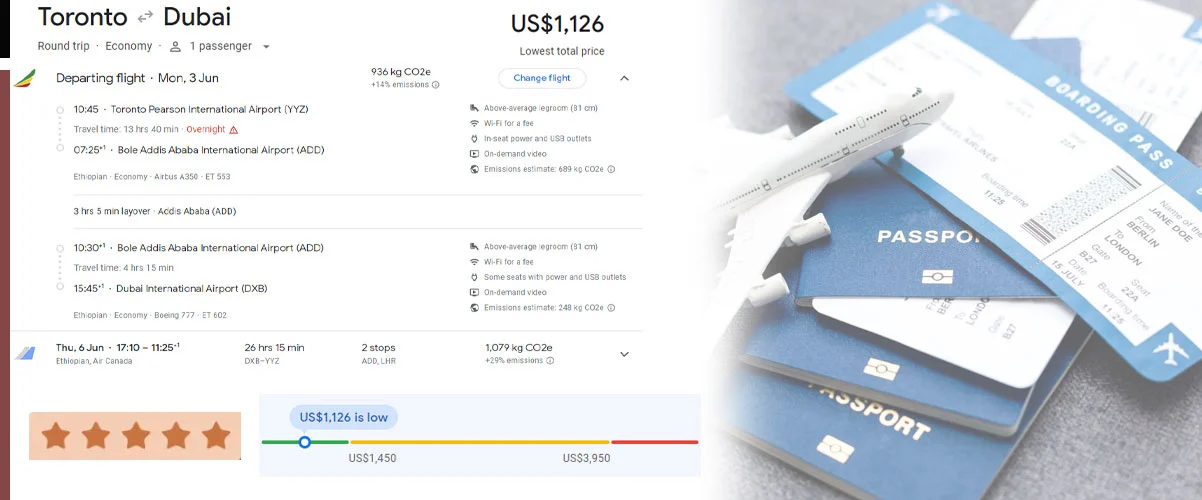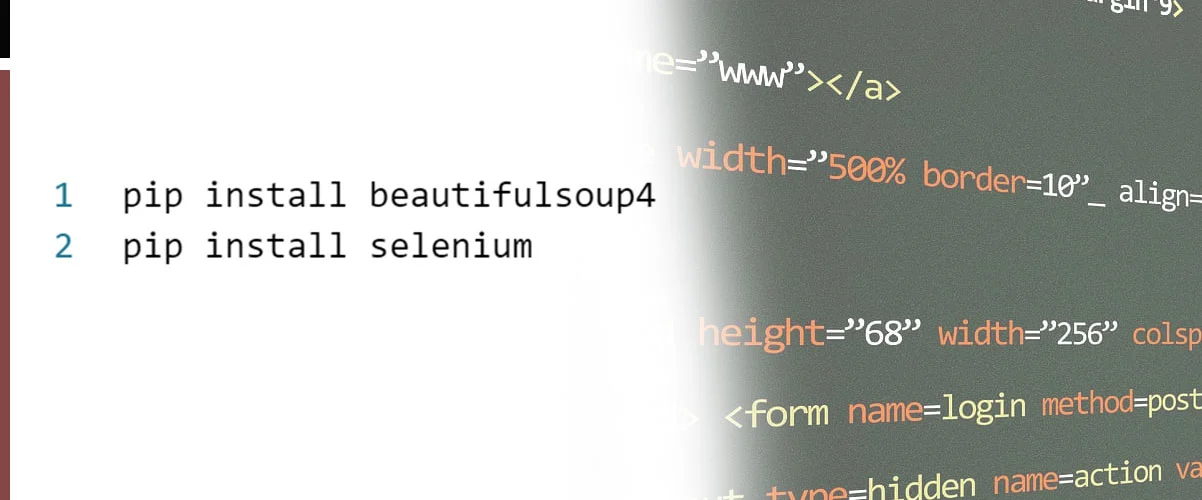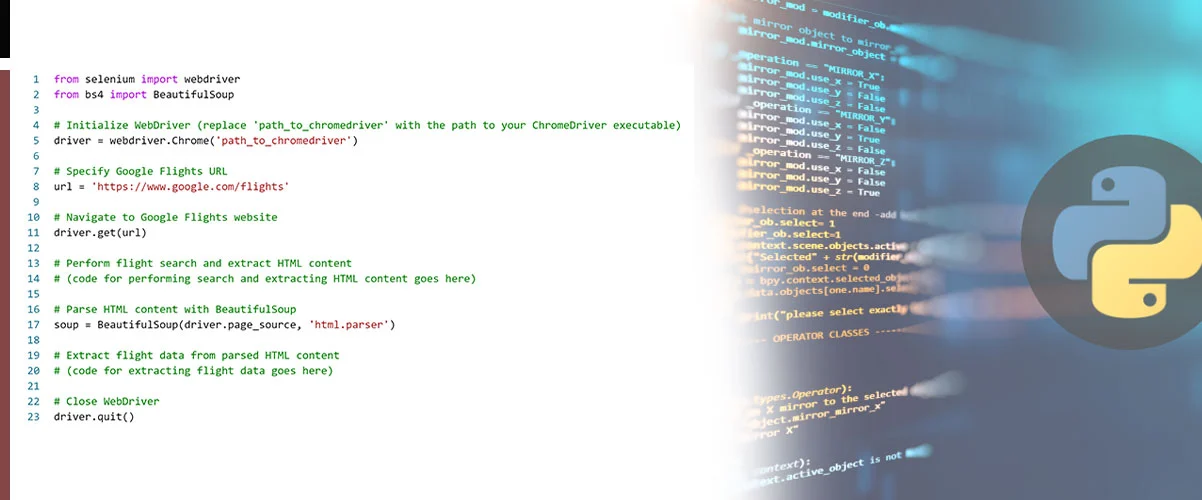How to Scrape Google Flights with Python?

Introduction
In today's travel landscape, where every minute detail can impact one's journey, having access to precise flight information is indispensable for travelers aiming to secure the most favorable deals and seamless itineraries. Google Flights is a beacon in this realm, offering travelers a robust platform with advanced flight search and comparison functionalities. However, manually gathering and analyzing flight data from Google Flights can prove arduous and ineffective.
This is where the power of Python and web scraping techniques come into play. Travelers and businesses can streamline to collect flight data from Google Flight data by leveraging Python's capabilities and employing web scraping methodologies. Whether comparing prices, exploring different travel options, or tracking flight trends, web scraping Google Flight prices with Python offers a practical and efficient solution.
This guide delves into the intricacies of scraping Google Flights with Python, exploring techniques to collect flight data from Google Flight data, analyzing flight prices, and uncovering valuable insights to optimize travel planning. From understanding the fundamentals of web scraping for flight websites to harnessing Python libraries like BeautifulSoup and Selenium, we'll equip you with the knowledge and tools needed to navigate the world of flight prices data scraping services effectively.
Understanding Google Flights
Google Flights is a powerful online flight search engine provided by Google. It is designed to simplify the process of finding and booking flights. It offers users a user-friendly interface and many efficient flight planning and booking features.
Google Flights' standout feature is its extensive search functionality. You can search for flights based on a variety of criteria, including destination, dates, number of passengers, and preferred airlines. The platform also offers flexible date options and displays prices for different days, empowering you to find the most budget-friendly travel options.
Google Flights also provides users valuable information about flight details, including flight durations, layovers, and airline options. Users can easily compare prices and choose the best flight itinerary based on their preferences and budget.
Google Flights goes the extra mile by offering a price tracking feature. This tool allows you to keep a close eye on price changes for specific flights and receive notifications when prices drop. Stay informed and seize the best flight deals with this invaluable feature.
Overall, Google Flights is a valuable tool for travelers, providing them with the information and tools they need to plan and book their flights quickly and confidently.
Why Scrape Google Flights Data?

Scraping Google Flights data offers numerous benefits for travelers, travel agencies, and businesses alike, providing valuable insights and opportunities for optimizing travel planning, pricing strategies, and competitive analysis. Here are some compelling reasons to scrape Google Flights with Python:
Access to Comprehensive Flight Information: By scraping Google Flights data, travelers gain access to comprehensive flight information, including prices, schedules, airlines, and available routes. This enables travelers to compare options, find the best deals, and plan their trips more efficiently.
Price Monitoring and Tracking: Web scraping Google Flight prices allows travelers to monitor price fluctuations for specific flights over time. By tracking price trends, travelers can identify optimal booking times, take advantage of price drops, and secure the most cost-effective travel options.
Flexible Date Analysis: Google Flights offers flexible date options that allow users to compare prices for different travel dates easily. By scraping Google Flights data, travelers can analyze price variations across multiple dates and identify the most affordable travel options, saving both time and money.
Customized Itinerary Planning: With access to detailed flight data from Google Flights, travelers can customize their itinerary based on preferences such as preferred airlines, layover durations, and departure/arrival times. This flexibility enables travelers to create personalized travel plans that suit their specific needs and preferences.
Competitive Analysis for Travel Agencies: For travel agencies and businesses in the travel industry, scraping Google Flights data provides valuable insights into pricing trends, competitor strategies, and market dynamics. By analyzing flight prices data scraping services, businesses can identify opportunities for competitive pricing, optimize inventory management, and enhance their overall competitiveness in the market.
Market Research and Forecasting: Scraping Google Flights data facilitates market research and forecasting for the aviation industry. By analyzing historical flight data and trends, industry analysts can gain valuable insights into passenger demand, route popularity, and market dynamics, helping airlines and other stakeholders make informed decisions and strategic planning.
Enhanced Customer Experience: By leveraging scraped Google Flights data, travel agencies and online booking platforms can offer customers a more seamless and personalized booking experience. By providing accurate and up-to-date flight information, businesses can enhance customer satisfaction, build loyalty, and increase repeat bookings.
Scraping Google Flights data with Python and web scraping techniques offers numerous benefits for travelers, travel agencies, and businesses in the travel industry. From accessing comprehensive flight information to monitoring price fluctuations, conducting competitive analysis, and enhancing the overall customer experience, web scraping Google Flights data provides valuable insights and opportunities for optimizing travel planning and decision-making.
Scraping Google Flights with Python
Scraping Google Flights with Python involves using web scraping libraries such as BeautifulSoup or Selenium to extract flight data from the Google Flights website. Here's a step-by-step guide to scraping Google Flights with Python:
Installing Required Libraries

Before getting started, ensure that you have Python installed on your system along with the necessary libraries. You can install BeautifulSoup and Selenium using pip:
Setting Up Selenium WebDriver
If you choose to use Selenium for web scraping, you'll need to download the appropriate WebDriver for your preferred web browser (e.g., ChromeDriver for Google Chrome). Make sure to place the WebDriver executable in your system's PATH or specify its location in your Python script.
Writing the Scraping Script
Next, write a Python script to scrape flight data from Google Flights. You can use BeautifulSoup to parse the HTML content of the search results page or Selenium to automate interactions with the website.

Extracting Flight Data
Once you have the HTML content of the search results page, use BeautifulSoup to extract relevant flight data such as prices, airlines, departure/arrival times, and flight durations. You can identify the HTML elements containing this information by inspecting the page source or using browser developer tools.
Storing and Analyzing Flight Data
After extracting flight data, you can store it in a structured format such as a CSV file or database for further analysis. Analyze the data to identify trends, compare prices across different airlines and dates, and make informed decisions when planning your travels.
Conclusion
Scraping Google Flights with Python empowers travelers and businesses to unlock valuable flight data, revolutionizing the travel aggregators process. Whether pursuing unbeatable deals, scrutinizing pricing patterns, or meticulously comparing flight options, web scraping emerges as a formidable ally, streamlining data collection and analysis with precision. Ready to elevate your travel planning game? Harness the power to scrape mobile travel app data and embark on a journey of optimized travel experiences and unparalleled insights. Contact Travel Scrape where every journey begins with data-driven decisions!